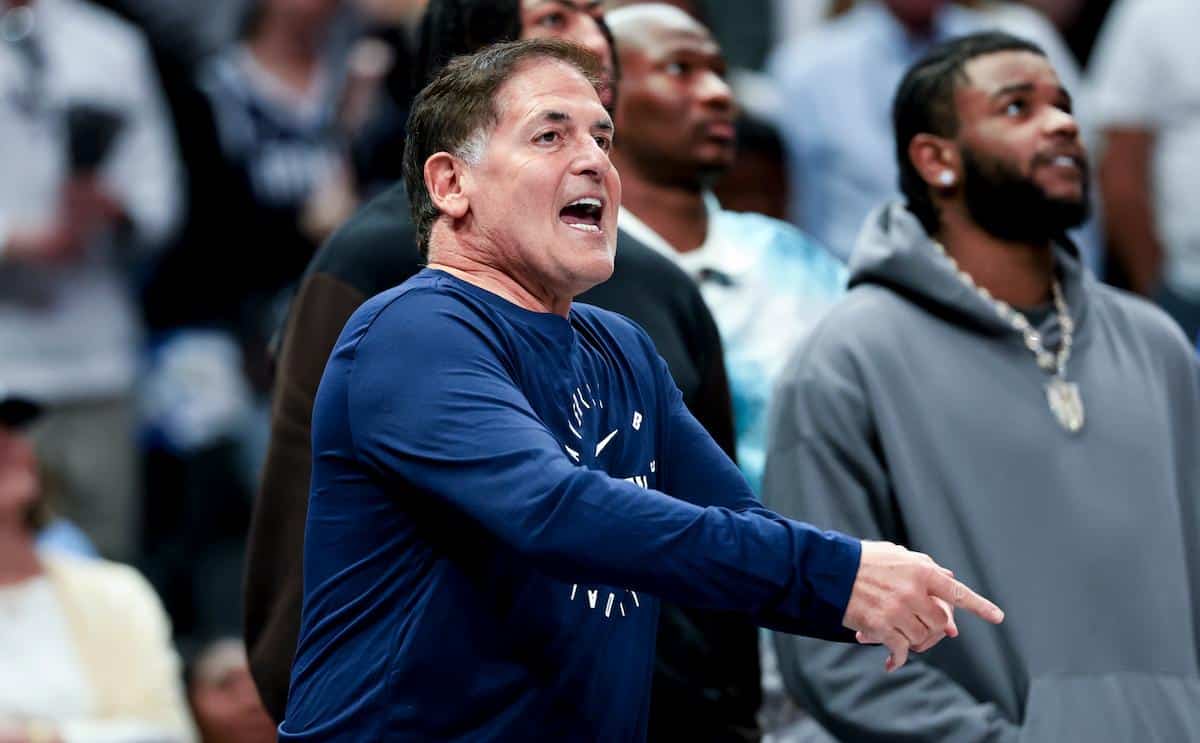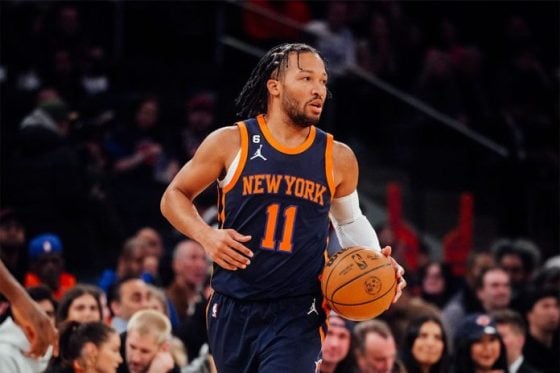There’s been a lot of discussion surrounding Jayson Tatum in the past 72 hours, but none of it really got at what really matters to him.
“Do you think people don’t look at your overall game—your defense, your rebounding, your assists—do you think you’re disrespected in that aspect?” asked the Boston Globe’s Gary Washburn, directly referencing the online discourse that had consumed Boston Celtics media following the Game 2 loss.
Washburn knows that NBA players, specifically those of this generation, cannot possibly avoid online discourse, nor can they totally block out the noise, judgements, or demands. When Steven A. Smith says that Tatum needs to play better on national TV, you bet he hears about it. When Celtics Twitter turns into a battleground of those saying Tatum needs to be more dominant as the team’s resident best-player and those pointing out that he’s actually been more efficient in the last three games than Jalen Brunson, who everyone seems ready to coronate as our new king.
I have no patience for that kind of discourse, since it is conducted entirely in bad faith. For once, NBA podcasts and debate shows—which can be heavy on the heuristics and light on research—had the Tatum discussion better since at least they were looking each other in the eye. I respect those who can argue behind profile pictures, online alias’ and 140-character responses, but that’s not my type of function.
Tatum can see the asymmetrical narratives created online, where one person can infinitely dunk on another using the “quote” feature, all but ensuring their point is perfectly foregrounded in an incomplete snapshot of the argument. And he is kidding himself if he says it doesn’t bother him, but that doesn’t mean he takes it personally either.
“I wouldn’t say I take it as disrespect,” Tatum answered, explaining how he values the media and the job they do to enhance the game. “I would love to make every shot I take, and I know I can shoot better and I will… just trying to impact the game in other ways and dominate, and not just be defined as a scorer.”
With Washburn asking him about the criticism, the question is coming from someone he knows and has been around a lot in his career. He gave a mature, civil answer about a discourse that would drive most people insane. But it still didn’t discuss what matters most to him, and no Celtics fan page, reporter, blogger, national pundit or even Celtics coach could have managed that.
The only one who knew what he needed to hear was his brother: Jaylen Brown.
“Tell ‘em to stop playing with you,” said Brown to Tatum during a timeout, proving he was serious with several emphatic claps. “I’m Big Deuce. I’m Big DEUCE! Come on!!”
This is Brown’s magic. He didn’t implore Tatum to “prove the haters wrong,” nor did he insist that he should do this “for the city” or even for the team. He pulled out the one card guaranteed to get Tatum’s attention: his son, Deuce.
Because ultimately, Tatum cares about the criticism. He cares about making shots and winning games, and he cares about going down as one of the great players in Celtics history. He’s said that all himself. But none of that comes close to how much he cares about Deuce, and Brown knew that he was the key to unlocking him.
Grammatically, Brown is acting as Tatum’s internal dialogue, guiding him past all the many things he could be thinking at that moment—drive or look for a jumper? Who will be my kick out option? Does Jaylen have a good matchup right now?—to instead focus on the one thing that actually matters. Show the world what Deuce’s dad is all about.
Both before and after this moment, Tatum played an excellent game. He was assertive and twitchy with his decisions, relentless finding what and whom he was looking for on offense and putting his stamp on the defensive end with powerful rebounding. He led the Celtics in scoring, but wasn’t nearly as efficient as Brown. But he found more angles, making all nine of his free throws and adding the dagger—an impossible turnaround over the backboard and Max Strus—just for good measure.
Photo by Jason Miller/Getty Images
The Tatum discourse over the next few days will be the inverse of what came before. Those looking to discredit Tatum will point to statistics like his 25 percent three point shooting or his general lack of efficiency, while those who defended Tatum against comparisons to Brunson and Shai Gilgeous-Alexander—posting graphics like “Brunson in the last three games: (random collection stats) vs. Tatum in the last 3 games (same random collection of stats but better)”—will surely take some victory laps.
The demands that Tatum dominate games like the Kobe Bryants and LeBron Jameses of memory has never been true to who he was, but it’s not like he didn’t invite that type of label. His personal image could not be more Kobe-esque, and it’s clear that he cares about taking the last shot in a close game, though the Celtics have played exactly zero “clutch” minutes in the playoffs thus far.
In some ways, Tatum’s self-styling has been self-limiting, frequently harkening back to the influence of Kobe and other idols while forgetting that Tatum has lead a completely unique NBA life. Bryant was trying to mimic Michael Jordan, all the way down to his haircut and the being-a jerk-to-your-teammates piece. But Tatum has never been wired like that, nor has his team ever asked him to be.
In reality, his career has been defined by his brotherhood with Brown, standing opposite the revolving door of supporting—sometimes predominant—players like Kyrie Irving and Kemba Walker. It’s no surprise that Brown knew what to do when all of us—and maybe even Tatum himself—weren’t sure what to say.
That continuity is ultimately the Celtics’ advantage. The Cleveland Cavaliers arguably had the best player in the game last night in Donovan Mitchell, who was simply unable to miss for long stretches last night. But while both Tatum and Mitchell’s career have yielded zero championships, the latter’s has not been defined by brotherhood and closeness with a team and a place.
Since his early days in Utah, Mitchell always had one eye out the window and one foot out the door. We can’t know for sure, but I doubt Darius Garland found the perfect words to inspire Mitchell in the biggest moment, since the two were clearly not on the same page in the fourth quarter. One such moment saw Mitchell dribble it up in transition with Garland completely unmarked on the right wing, quite literally waving his hands demanding the ball.
But Mitchell didn’t even look at him. It was going to be him against the world, and literally here was him versus five retreating Celtics. Garland was incensed, and the possession petered out.
Meanwhile, Tatum and Brown spent the fourth quarter trying to find each other openings, realizing with a hobbled and honestly just not strong enough Evan Mobley in the paint, they could get downhill at will. It was like watching the best version of the 2022 Celtics, in which their success was dictated almost entirely by how often they could get to and finish at the rim.
This series has been difficult without Kristaps Porzingis, but Tatum throwing caution to the wind and trying to force everything is not the golden ticket that will get the Celtics through. Rather, Tatum and Brown’s seven-year symbiosis—the one thing that the Celtics have that no other team, not even the Nuggets, can boast—is their single great advantage.
And they know it. Game 3 saw the Celtics finally accept that this wasn’t going to be a cakewalk, and they played with poise, maturity, and calm intensity to take the teeth out of the Cavaliers that bit their head off two days ago. Without Porzingis, it will take Tatum and Brown each being individually great, but they’ll do it—like everything else they’ve achieved—together.






